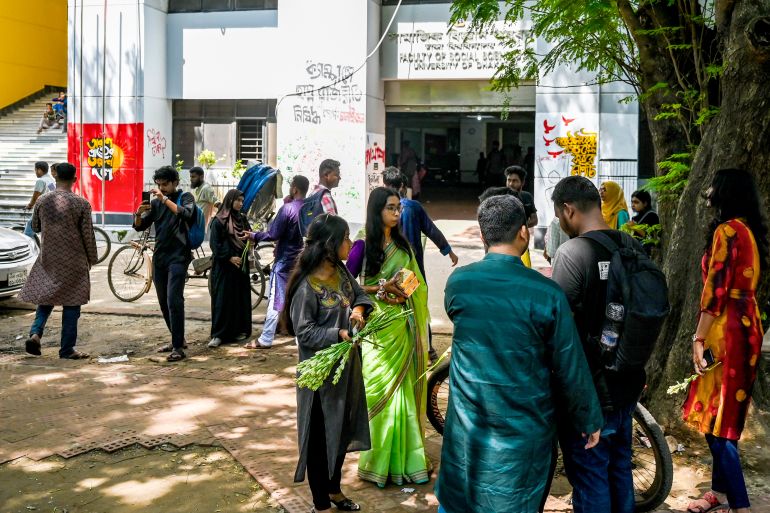Classes resume at Bangladesh university at heart of anti-Hasina protests
Dhaka University is full again, weeks after authorities shuttered the campus following deadly antigovernment demonstrations.
Students gather at the Dhaka University campus, in Dhaka, Bangladesh on September 22, 2024 [Munir Uz Zaman/AFP]Published On 22 Sep 202422 Sep 2024
Students have returned to classes at Bangladesh’s Dhaka University, after a weeks-long shutdown sparked by a student-led uprising that toppled former Prime Minister Sheikh Hasina.
Tens of thousands had demonstrated on the campus and in the surrounding Shahbagh neighbourhood as protests against job quotas morphed into a nationwide struggle to end Hasina’s 15 years of iron-fisted rule.
As the protests swelled in July, authorities shuttered the campus as part of a crackdown on the demonstrations that killed hundreds.
Enrolled at the university were several of the top student protest leaders, some of whom were snatched by plainclothes police and held in custody for several days.
On Sunday, the lecture halls were full again, with students chatting in groups along tree-covered walkways and buying drinks and snacks at canteens.
Classes had started again in all but four or five departments, assistant proctor Mohammad Mahbub Quaisar, who was appointed after previous administrators loyal to Hasina resigned, told the AFP news agency.
“Students are attending in a joyous mood,” he said.
Hasina’s government was accused of widespread abuses, including the mass detention and extrajudicial killing of political rivals.
More than 600 people were killed in the weeks leading up to Hasina’s removal in early August, according to a preliminary United Nations report that said the toll was “likely an underestimate”.
Since her departure for exile in neighbouring India, cabinet ministers and other senior members of Hasina’s party have been arrested, and her government’s appointees have been purged from courts and the central bank.
In the leafy streets of the Shahbagh neighbourhood, colourful new murals exhort the public to “destroy the iron doors of prison” and celebrate Bangladesh’s “rebirth”.
“It was like we were in an oppressive era when we could not say anything,” said master’s degree student Kalimulla Al Kafi, 25, of the crackdown ordered by Hasina.
“Today it feels like I am attending classes with freedom,” he said. “We can express ourselves freely.”
